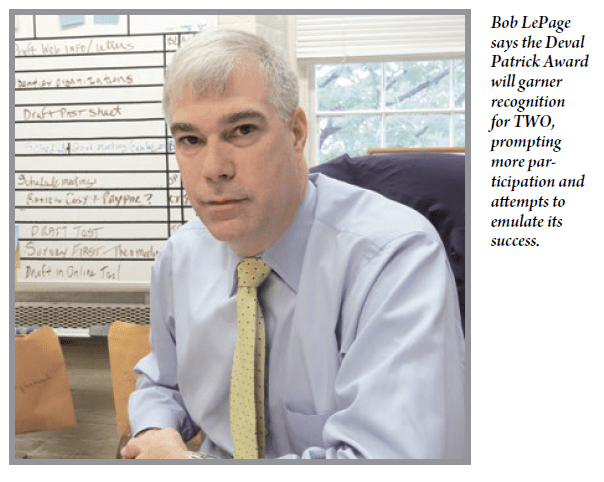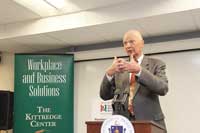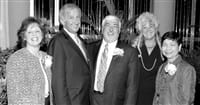Getting the Jobs Done – TWO Program Is Honored for Closing Workforce Skills Gaps
The economic imperative for aligning the workforce needs of Massachusetts with the needs of students attending community colleges is powerful and growing. Massachusetts is at a crossroads in its capacity to compete — and the ability of its residents to fully participate in the current economy and the rewards that employment brings. For the Commonwealth to flourish going forward, a high priority must be placed on training the workforce that is needed by the industries that are driving the Massachusetts economy. That responsibility falls squarely on the Commonwealth’s public higher-education system, most predominately the 15 community colleges.”
That was one of the more hard-hitting bits of analysis/commentary contained in a blistering 2011 report issued by the Boston Foundation, a document that essentially called out the state’s community colleges for not doing enough to help train a workforce to meet industry needs and made some controversial suggestions about how to bring about change, such as a centralization effort that would do away with local boards of trustees at the schools.
Bill Messner, now, as then, president of Holyoke Community College, remembers his reaction to that report. His initial response was that its authors didn’t do enough research — at least when it came to the schools west of Worcester — and missed some key evidence that community colleges in the 413 area code were, in fact, being imaginative and somewhat effective in efforts to close so-called skills gaps within the workforce.
Still, Messner and others, like his counterpart at Springfield Technical Community College, Ira Rubenzahl, chose not to shoot the messenger — although they were highly critical of those suggestions to centralize the community college system and put it under one board — and heed calls from the Boston Foundation, as well as the Commonwealth Corp. (which issued its own report with similar findings at that time) to do more to partner with businesses and workforce-development agencies to properly align their training programs with the specific needs of industry sectors.
And so it was with a large dose of pride that HCC and STCC learned that together, they had won the first Deval Patrick Award for Community Colleges, named after the former governor and funded by the Boston Foundation, for work undertaken through a program called TWO (Training & Workforce Options), an acronym that is now resonating throughout the local business community and its healthcare sector.

The cash prize, to be split by the schools, is $50,000 — a small amount, especially when budget cuts of nearly 10 times that number were announced by the Baker administration for both schools the same week as the award was presented. But the rewards go well beyond the money (which will go into both schools’ general operating funds), said both Messner and Robert LePage, vice president of Foundation and Workforce Training at STCC and the school’s TWO point person.
Indeed, the award will bring recognition to the program, said LePage, adding that with that exposure might come support from other state agencies as well as more participation among area businesses and thus more progress in combatting regional workforce issues.
“Recognition from a group like the Boston Foundation is the kind of endorsement that can get others to invest in you — I hope this is something we’re able to leverage,” he explained. “People want to see a good return on their investment, so I’m hopeful that this will bring some eyes to Western Mass., prompt others to appreciate the work we’re doing here, and cause people to say there are things happening here that they can adopt.”
In many ways, the Boston Foundation report validates TWO’s mission and underscores the success stories authored in its first three years, said LePage, adding that there have been many of them.
For example, TWO has partnered with Baystate Health to create a regional ICD-10 (medical coding) incumbent worker training academy and is working with regional employers to launch an advanced hospital medical coding academy that will prepare workers for the many changes coming to that important realm within healthcare. Meanwhile, it has worked with MassMutual and a host of other employers to develop a new advanced call center and customer service certificate, a program that has succeeded in placing a number of individuals in jobs within that emerging sector.
And it has taken the lead in training individuals for the gaming industry that will soon become a force in this state through creation of the Mass. Casino Careers Training Institute.
Work in Progress
TWO’s mission — and its operating philosophy — are summed up nicely in this passage from the joint application submitted by HCC and STCC for the Deval Patrick award:
“Prior to community college reforms, the two colleges often worked in a reactive form and in competition with one another,” the application authors wrote. “This often led to an inefficient and duplicative approach to workforce development and employer engagement in Hampden and Hampshire Counties. With the formation of Training and Workforce Options, the two colleges have formed a cohesive and proactive sales and training approach and have effectively broadened the reach of both colleges. TWO has provided HCC and STCC a stronger and unified voice and further positioned the colleges to provide a deeper and wider leadership role in serving regional workforce needs that serves as a catalyst to support economic development success.”
It has assumed this leadership role through engagement with the business community and agencies ranging from area Regional Employment Boards to one-stop career centers to economic-development-related agencies to identify needs and develop programs to address them.
LePage said that through its so-called ‘business discovery model,’ TWO has met with more than 200 businesses in five key industry sectors — financial services/customer service, healthcare, hospitality and culinary, IT, and manufacturing to validate employer needs.
And program partners run the gamut, from major employers such as MassMutual, Baystate Health, Smith & Wesson, Six Flags, and MGM, to smaller operations such as Mustang Seats, the Three Rivers-based company that makes replacement motorcycle seats for Harley Davidson, Honda, BMW and other brands, and Ludlow-based Chemi-Graphic, which manufactures nameplates, labels, and other products for a wide range of customers.
Overall, TWO’s most profound impact has been with closing those aforementioned gaps between the skill sets that the current workforce possesses and the skills that are needed within certain industries and for specific jobs.
And two of the better examples of how TWO has operated are the ICD-10 incumbent worker training academy and the advanced call center and customer service certificate.
ICD-10, as that name would suggest (at least to those in the industry) is the 10th revision of the International Statistical Classification of Diseases and Related Health Problems, or ICD, said Jason Pacheco, a senior workforce-planning consultant for Baystate Health. And it represents a significant change from ICD-9.
“ICD-9 has around 9,000 or 10,000 codes, while ICD-10 has roughly 60,000 codes,” he explained, adding that this nearly exponential increase is projected to generate a decrease in productivity — primarily because it already has in countries where ICD-10 is being used. As a result, said Pacheco, health care providers and medical practices will either have to bring on more employees or outsource more work.
And to widen the pool of potential job candidates, TWO is partnering with Baystate, the regional Employment Board of Hampden Country, and other players on worker training initiatives that have, to date, involved more than 50 companies.
“The concept to fill the gap in the labor was to come up with a development program,” said Pacheco. “What Training and Workforce Options has been able to do is work with those two community colleges to help align the students and their curriculum toward flexible workforce arrangements that meet employers’ needs.”
And that’s just one example, he said, of how Baystate and others in the healthcare sector have partnered with TWO to identify and close gaps involving several specific positions, including sterile processing technicians, medical lab technicians, pharmacy technicians, and others.
That list includes call center employees, he went on, adding that Baystate is one of many area employers, large and small, that have participated in the Advanced Call Center & Customer Service Training program.
To date, three cohorts of students have produced more than 55 graduates, with roughly 80{06cf2b9696b159f874511d23dbc893eb1ac83014175ed30550cfff22781411e5} of those individuals placed in companies like MassMutual, PeoplesBank, Health New England, and many others, thus meeting growing need for such specialists.
To date, three cohorts of students have produced more than 55 graduates, with roughly 80{06cf2b9696b159f874511d23dbc893eb1ac83014175ed30550cfff22781411e5} of those individuals placed in companies like MassMutual, PeoplesBank, Health New England, and many others, thus meeting growing need for such specialists.
“There are quite a few call centers in the region if you start to add them up, and they’re across many sectors of the economy,” said Nick Fyntrilakis, vice president of Community Involvement for MassMutual, which has hired several of those graduates. “And a growing challenge for everyone with a call center was finding qualified applicants; different companies have different needs, but there are some foundational pieces that run across the whole spectrum.”
TWO, working in conjunction with those employers and the Regional Employment Board developed a curriculum, identified solid candidates for the program, established a call center simulation center, and developed a formal employer engagement-implementation process to improve student placement, he went on, adding that these various steps have all helped ensure success and sum up what the program is all about.
“To us, that’s the kind of work that community colleges were designed to do — that’s what they were built to do — to plug into the workforce needs of the community,” said Fyntrilakis, “and tailor programs that identify people that have a skills gap or require additional training or education, and then help connect them to those careers.”
And that’s exactly the type of work that the state’s community colleges were not doing, at least according to the Boston Foundation.
Bottom Line
Messner told HCN that while he had confidence in the joint submission for the Deval Patrick Award, he wasn’t exactly expecting the two Western Mass. schools to prevail in that competition.
“I was more than a little surprised by this, because we assumed that the Boston Foundation, being a Boston foundation, might be inclined, especially for this first award, to stick closer to home,” he said, adding quickly that beyond geography, he wasn’t surprised by the choice.
That’s because of TWO’s quickly amassed track record and the promise to add to its portfolio of success stories.
The Patrick Award might help with all that, and, as Messner, LePage and others, mentioned, that’s a far bigger prize than a pair of $25,000 checks.



Comments are closed.